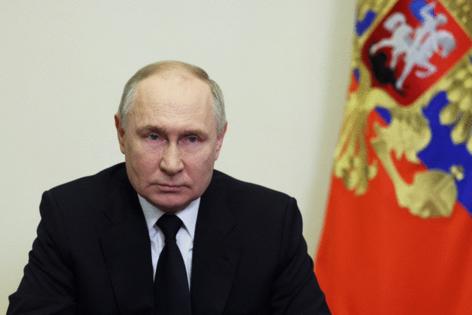Editorial: Putin's weaker than he looks. Seize the opportunity
Published in Op Eds
Russian President Vladimir Putin has sought to project an image of economic strength while prosecuting the war in Ukraine, as if he could easily outlast the West’s efforts to counter his aggression. If President-elect Donald Trump and other Western leaders want to negotiate a prudent peace deal, they shouldn’t buy it.
More than most autocrats, Putin understands the importance of economic resilience. Before invading, he built a fiscal fortress to protect his regime. It included a balanced federal budget; minimal foreign borrowing; hundreds of billions of dollars in central bank reserves; and a $175 billion national wealth fund, designed to smooth the effect of volatile energy prices on the country’s fossil-fuel-dependent revenue.
This preparation (alongside continued oil and gas exports) has helped Putin survive Western sanctions and defy predictions of economic collapse. He delivered a vast stimulus by ramping up military spending from less than 4% to (by some estimates) 10% of gross domestic product — providing high-paying jobs in defense production and life-changing payments to the often-destitute families of soldiers. Together with government-subsidized mortgage loans (now discontinued), the largesse fueled a consumer spending and construction boom.
Now the costs are mounting. Everything is more expensive: By one estimate, a representative basket of consumer goods in Russia costs about 80% more than before the war. Wages have shot up, with much of the labor force killed, wounded or otherwise unavailable. Surging inflation has forced the central bank to raise its key interest rate to an extreme 21%, crushing investment in civilian businesses. The stimulus is petering out: By official measures, growth is expected to slow to 1% next year, from 3.9% this year. Adjusted for independent measures of inflation, Russia’s real output has contracted sharply.
Worse for Putin, his fortress is much diminished. Some $300 billion in central bank reserves are stuck in the West, perhaps never to return. The wealth fund’s liquid cash, denominated in Chinese yuan, has dwindled to the equivalent of about $31 billion. Profligate lending has weakened banks. This renders Russia much more vulnerable to economic shocks, such as a drop in global oil prices. The longer the war goes on, the greater the damage — and the greater the need to resort to unpopular measures, such as raising taxes or cutting social spending.
Granted, economic constraints alone won’t force Putin to end the war anytime soon. They do, however, reflect an advantage that Western nations should press. The combined economies of the U.S. and Europe are more than 20 times larger than Russia’s. Showing continued resolve to outspend Putin would help bring him to the negotiating table and offer crucial leverage. Such a commitment — combined with continued supplies of sophisticated weaponry and toughened sanctions — would maximize the chances of a reasonable deal.
Public patience with extending aid to Ukraine is clearly ebbing, in the U.S. and elsewhere. But slashing support now would not end the war on desirable terms. On the contrary, it would embolden Putin and — in all likelihood — prove far more costly in the long run. Russia’s economy is weaker than it looks. The West should seize this opportunity while it can.
____
The Editorial Board publishes the views of the editors across a range of national and global affairs.
©2024 Bloomberg L.P. Visit bloomberg.com/opinion. Distributed by Tribune Content Agency, LLC.




























































Comments